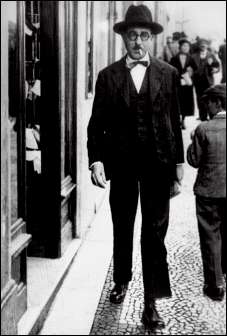 |
Portugal
is a country of poets and writers. A country of daring and romantic,
nostalgic and adventurous people, who have put their Portuguese souls
into their chapters and verses. King D. Dinis, in the 12th Century, was
an inspired troubadour and we can travel to the heart of the Middle
Ages through the tales of Fernão Lopes. On stage, Gil Vicente's plays,
though written 500 years ago, appear timeless and still bring a smile
to our lips. And Luís de Camões, the greatest of them all, almost
losing his life to create his epic «Os Lusíadas», which narrates the
deeds of the Portuguese as they sailed on seas never previously
navigated.
The Discoveries created a new type of literature,
that of travel; of particular note are the accounts written by Pêro Vaz
de Caminha. Romanticism brought us names such as Almeida Garrett,
Cesário Verde, Antero de Quental, Alexandre Herculano and Camilo
Castelo Branco. At the end of the 19th Century, Eça de Queirós,
Oliveira Martins and Teófilo Braga managed to subvert the classical
rules and follow the principles of a new culture, in large part linked
to French Realism.
Truly innovative was Fernando Pessoa,
the most important figure in 20th Century Portuguese writing, whose
talent was such and whose writings so extensive that he had to take
refuge behind countless heteronyms. He is the great poet of symbolism
and modernism, a genius who asked questions in verse concerning the
fundamental questions of human existence, as a philosopher or a person
coping with daily survival, in a writing style built on the pillars
which have truly defined our modernity.
Eugénio de Andrade,
Sophia de Mello Breyner Andresen, António Ramos Rosa, Mário Cesariny,
Herberto Helder and Vasco Graça Moura are other essential names to be
found on the list of contemporary poets. And the list for fiction
includes the works of Virgílio Ferreira, Miguel Torga, José Cardoso
Pires, Agustina Bessa-Luís, António Lobo Antunes and José Saramago, who
was awarded the Nobel Prize for Literature in 1998.
To know more:
Camoes Institute: Portuguese Literature